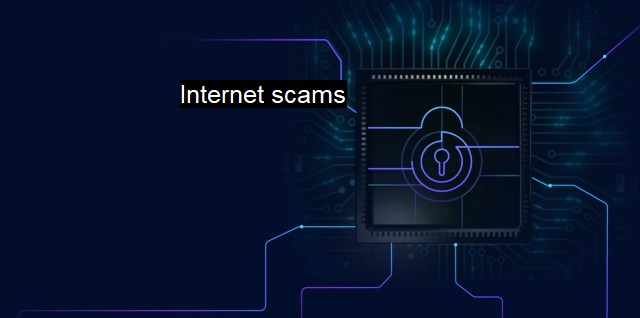What are Internet scams?
Exploring Various Kinds of Internet Scams and Why Cybersecurity is Esssential: A Comprehensive Overview
Internet scams, also known as online fraud, are misleading or deceptive practices conducted through the internet, with the purpose of deceiving users and exploiting them financially. These schemes range from phishing attacks, identity theft, and fraudulent money-making schemes, to ransomware attacks and illicit goods trading. understanding internet scams is significant as they are major threats to both individuals and organizations on the internet.An internet scam operates by luring unsuspecting users into divulging sensitive information, money or both. These scams often seem authentic, disguising themselves as genuine business opportunities, legitimate organizations, or familiar contact names. They use tactics that create a sense of urgency or appeal to the victim’s kindness or greed to trick them into sharing confidential information or money. This aspect of confidentiality is where cybersecurity becomes especially important, as confidentiality is one of the three major principles of cybersecurity, alongside integrity and availability.
One common type of internet scam is the phishing scam. In phishing, cybercriminals send seemingly harmless emails or messages that appear to come from a trusted source, such as a bank, an online retailer, or a social networking site, tricking unsuspecting recipients into revealing sensitive information like passwords and credit card numbers. Phishing can also involve malicious attachments that, when downloaded or clicked, can infect the device with malware or redirect the user to a fraudulent website where their information can be harvested.
Another prominent type of internet scam is known as ransomware. Ransomware is a type of malware that, once installed on a victim's computer, encrypts all files and data, making them inaccessible. The cybercriminals then demand a ransom, typically in cryptocurrency, to provide the decryption key. Governments, hospitals, and large corporations are common targets of such attacks due to their vast amounts of stored sensitive data.
Fraudulent money-making schemes, also known as advance-fee scams, are another prevalent type of internet scam. These scams trick victims into sending money upfront in exchange for a promised good or service that doesn't actually exist. The infamous Nigerian prince email scam is a classic example of an advance-fee scam.
To protect from these scams and to enhance cybersecurity, robust antivirus software serves as an essential line of defense. Antivirus programs can detect and block known malware, including ransomware, and warn users about phishing attempts. They scan files, emails, and websites for potential threats and remove any detected malicious software.
Secure practices like strong, unique passwords and two-factor authentication can also provide an additional layer of protection. Further, it is essential to stay educated on the different types of scams and their tactics to spot them and protect oneself. Regular backups can also help recover data in the event of a ransomware attack.
While technological solutions to scams, such as antivirus software, are critical, human awareness is equally important. A significant proportion of scams are successful due to human error — the launching of an unknown attachment, the entry of confidential data on an illegitimate site, or responding to messages or emails without verifying their source.
Internet scams are deceitful online practices meant to manipulate users into divulging confidential information or money. The threat they pose is significant and multifaceted, demanding both strong cybersecurity practices and awareness to shield against potential harm. From phishing, ransomware, fraudulent schemes, individuals, and organizations, all should be well versed in identifying scams and taking the necessary precautions to defend against such threats.

Internet scams FAQs
What are some common internet scams?
Some common internet scams are phishing, fake tech support scams, fake online marketplaces, lottery scams, and investment scams.How can I protect myself from internet scams?
You can protect yourself from internet scams by installing antivirus software, being cautious of suspicious emails and links, using strong passwords, and verifying the authenticity of websites and companies before sharing personal information or making any payments.What should I do if I have been a victim of an internet scam?
If you have been a victim of an internet scam, you should immediately report it to your local law enforcement agency, your bank or credit card company, and the Federal Trade Commission (FTC). You should also change your passwords and monitor your accounts for any suspicious activity.How can I spot a potential internet scam?
You can spot a potential internet scam by being cautious of unsolicited emails and messages, looking out for poor grammar or spelling mistakes, being wary of offers that seem too good to be true, and verifying the authenticity of any website or company before sharing personal information or making a payment.| | A | | | B | | | C | | | D | | | E | | | F | | | G | | | H | | | I | | | J | | | K | | | L | | | M | |
| | N | | | O | | | P | | | Q | | | R | | | S | | | T | | | U | | | V | | | W | | | X | | | Y | | | Z | |
| | 1 | | | 2 | | | 3 | | | 4 | | | 7 | | | 8 | | |||||||